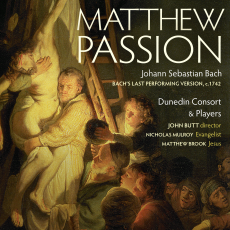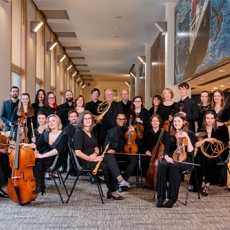JS Bach Matthew Passion - Dunedin Consort - SA-CD.net
This the Dunedin Consort's follow-up recording to their most wonderful Handel: Messiah, and it is a very successful follow-up indeed.
Subtitled as "Bach's last performing version c.1742", this contains revisions which are largely subtle differences from the more commonly heard editions today. Perhaps the most significant change is the addition of a viola da gamba to orchestra two who plays a different part to that in orchestra one. It lends a much darker and sombre timbre than one is used to and at first it made me concerned that my speakers were playing tricks on my ears. There were no tricks though, the textures are darker which perfectly reflects the sense of anguish that is ever present in the music. The sombre mood is almost Romantic with the depth of feeling that John Butt cajoles from the Dunedin Consort and Players.
Unlike in the Messiah, Butt here opts for one voice to a part, meaning that he uses a total of 8 singers for the majority of the work. Susan Hamilton, Clare Wilkinson, Nicholas Mulroy and Matthew Brook make up Choir One; Cecilia Osmond, Annie Gill, Malcolm Bennett and Brian Bannatyne-Scott make up Choir Two. Mulroy and Brook are the superb Evangelist and Jesus respectively; they are supported by Gill and Bennett as the two witnesses. Completing the vocal line-up are the Soprano in ripieno from Ali Darragh (who is also Ancilla I & II and Uxor Pilatus) and Frances Cooper; Petrus, Pilatus, Pontifex, Pontifex II from Michael Wallace and the Judas & Pontifex I from Roderick Bryce. There is not a weak link to be heard amongst them.
As Butt himself says in his wonderful notes, the concept of this recording is one of dialogue (between soloists; soloists & choir and between choirs). The use of solitary voices really does allow this proposition to work - the expressive force adopted here would be overwhelming on a larger scale were it possible to train a choir to be able to sing in such a manner. The instrumentalists follow the "dialogues" with aplomb - both pointing and amplifying the musical argument with grace and sensitivity. All of this is helped by the pacing; fast enough to convey urgency and pain when needed yet relaxed when solemn moments require space.
This enterprise is perhaps best summarised with a quote from Butt's final paragraph in the notes to this set: "the performance reveals this work... to provide a musical experience that is almost on the threshold of what is emotionally bearable."
Where some companies would take Bach's use of two choruses and orchestras to conjure up a position between the two, Linn present them side by side yet the dialogue between the two ensembles in the opening Chorus and Chorale and their positioning is very tangible. Throughout, the sound is a model of clarity and yet is set far back enough to allow the two ensembles to coalesce into a convincing whole when the score dictates.
Highly recommended indeed, even if by the nature of Bach's score it is a less exhilarating experience than the Messiah as it is no less satisfying - they have whet my appetite for more!

